40 start with D start with D
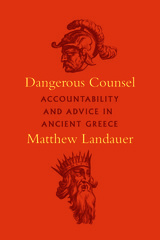
With Dangerous Counsel, Matthew Landauer analyzes the sometimes ferocious and unpredictable politics of accountability in ancient Greece and offers novel readings of ancient history, philosophy, rhetoric, and drama. In comparing the demos to a tyrant, thinkers such as Herodotus, Plato, Isocrates, and Aristophanes were attempting to work out a theory of the badness of unaccountable power; to understand the basic logic of accountability and why it is difficult to get right; and to explore the ways in which political discourse is profoundly shaped by institutions and power relationships. In the process they created strikingly portable theories of counsel and accountability that traveled across political regime types and remain relevant to our contemporary political dilemmas.
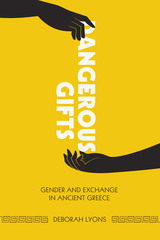
Deianeira sends her husband Herakles a poisoned robe. Eriphyle trades the life of her husband Amphiaraos for a golden necklace. Atreus’s wife Aerope gives away the token of his sovereignty, a lamb with a golden fleece, to his brother Thyestes, who has seduced her. Gifts and exchanges always involve a certain risk in any culture, but in the ancient Greek imagination, women and gifts appear to be a particularly deadly combination.
This book explores the role of gender in exchange as represented in ancient Greek culture, including Homeric epic and tragedy, non-literary texts, and iconographic and historical evidence of various kinds. Using extensive insights from anthropological work on marriage, kinship, and exchange, as well as ethnographic parallels from other traditional societies, Deborah Lyons probes the gendered division of labor among both gods and mortals, the role of marriage (and its failure) in transforming women from objects to agents of exchange, the equivocal nature of women as exchange-partners, and the importance of the sister-brother bond in understanding the economic and social place of women in ancient Greece. Her findings not only enlarge our understanding of social attitudes and practices in Greek antiquity but also demonstrate the applicability of ethnographic techniques and anthropological theory to the study of ancient societies.
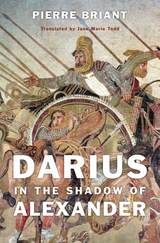
The last of Cyrus the Great’s dynastic inheritors and the legendary enemy of Alexander the Great, Darius III ruled over a Persian Empire that stretched from the Mediterranean to the Indus River. Yet, despite being the most powerful king of his time, Darius remains an obscure figure.
As Pierre Briant explains in the first book ever devoted to the historical memory of Darius III, the little that is known of him comes primarily from Greek and Roman sources, which often present him in an unflattering light, as a decadent Oriental who lacked the masculine virtues of his Western adversaries. Influenced by the Alexander Romance as they are, even the medieval Persian sources are not free of harsh prejudices against the king Dārā, whom they deemed deficient in the traditional kingly virtues. Ancient Classical accounts construct a man who is in every respect Alexander’s opposite—feeble-minded, militarily inept, addicted to pleasure, and vain. When Darius’s wife and children are captured by Alexander’s forces at the Battle of Issos, Darius is ready to ransom his entire kingdom to save them—a devoted husband and father, perhaps, but a weak king.
While Darius seems doomed to be a footnote in the chronicle of Alexander’s conquests, in one respect it is Darius who has the last laugh. For after Darius’s defeat in 331 BCE, Alexander is described by historians as becoming ever more like his vanquished opponent: a Darius-like sybarite prone to unmanly excess.
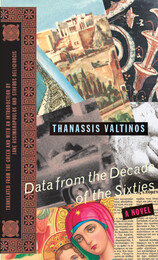
Just as Greece today struggles to adapt to a shifting political landscape, so Greece in the 1960s was convulsed by the collision of tradition and cultural transformation. In Data from the Decade of the Sixties, Valtinos assembles voices, stories, and news clips that capture the transformation of Greece, the monarchy giving way to a republic via dictatorship, the industrialization of its agricultural society, and the replacement of arranged marriages with love matches.
The many voices in this tour de force coalesce in a bricolage of documents: personal letters between friends and family, news reports, advertisements, and other written ephemera. As governments fall, sexologists, fortune-tellers, garage owners, and lonely matrons advertise their specialties and fantasies in want ads, while the young and lonely find escape within the cheap novels, movies, and gossip columns that enliven their barren existence.
Together these testimonies illuminate the tumult of 1960s Greece, where generations and values clash and Greek society struggles to adapt. Valtinos captures the pulse of a decade, portraying the spirit of the century in Greece and throughout the world.

The first fruits of Greek botany.
Theophrastus of Eresus in Lesbos, born about 370 BC, is the author of the most important botanical works that have survived from classical antiquity. He was in turn student, collaborator, and successor of Aristotle. Like his predecessor he was interested in all aspects of human knowledge and experience, especially natural science. His writings on plants form a counterpart to Aristotle’s zoological works.
In the Enquiry into Plants Theophrastus classifies and describes varieties—covering trees, plants of particular regions, shrubs, herbaceous plants, and cereals; in the last of the nine books he focuses on plant juices and medicinal properties of herbs. This edition is in two volumes; the second contains two additional treatises, On Odours and Weather Signs.
In De causis plantarum Theophrastus turns to plant physiology. Books 1 and 2 are concerned with generation, sprouting, flowering and fruiting, and the effects of climate. In Books 3 and 4 Theophrastus studies cultivation and agricultural methods. In Books 5 and 6 he discusses plant breeding; diseases and other causes of death; and distinctive flavors and odors. The Loeb Classical Library edition is in three volumes.
Theophrastus’ celebrated Characters is of a quite different nature. This collection of descriptive sketches is the earliest known character-writing and a striking reflection of contemporary life.

The first fruits of Greek botany.
Theophrastus of Eresus in Lesbos, born about 370 BC, is the author of the most important botanical works that have survived from classical antiquity. He was in turn student, collaborator, and successor of Aristotle. Like his predecessor he was interested in all aspects of human knowledge and experience, especially natural science. His writings on plants form a counterpart to Aristotle’s zoological works.
In the Enquiry into Plants Theophrastus classifies and describes varieties—covering trees, plants of particular regions, shrubs, herbaceous plants, and cereals; in the last of the nine books he focuses on plant juices and medicinal properties of herbs. This edition is in two volumes; the second contains two additional treatises, On Odours and Weather Signs.
In De causis plantarum Theophrastus turns to plant physiology. Books 1 and 2 are concerned with generation, sprouting, flowering and fruiting, and the effects of climate. In Books 3 and 4 Theophrastus studies cultivation and agricultural methods. In Books 5 and 6 he discusses plant breeding; diseases and other causes of death; and distinctive flavors and odors. The Loeb Classical Library edition is in three volumes.
Theophrastus’ celebrated Characters is of a quite different nature. This collection of descriptive sketches is the earliest known character-writing and a striking reflection of contemporary life.

The first fruits of Greek botany.
Theophrastus of Eresus in Lesbos, born about 370 BC, is the author of the most important botanical works that have survived from classical antiquity. He was in turn student, collaborator, and successor of Aristotle. Like his predecessor he was interested in all aspects of human knowledge and experience, especially natural science. His writings on plants form a counterpart to Aristotle’s zoological works.
In the Enquiry into Plants Theophrastus classifies and describes varieties—covering trees, plants of particular regions, shrubs, herbaceous plants, and cereals; in the last of the nine books he focuses on plant juices and medicinal properties of herbs. This edition is in two volumes; the second contains two additional treatises, On Odours and Weather Signs.
In De causis plantarum Theophrastus turns to plant physiology. Books 1 and 2 are concerned with generation, sprouting, flowering and fruiting, and the effects of climate. In Books 3 and 4 Theophrastus studies cultivation and agricultural methods. In Books 5 and 6 he discusses plant breeding; diseases and other causes of death; and distinctive flavors and odors. The Loeb Classical Library edition is in three volumes.
Theophrastus’ celebrated Characters is of a quite different nature. This collection of descriptive sketches is the earliest known character-writing and a striking reflection of contemporary life.
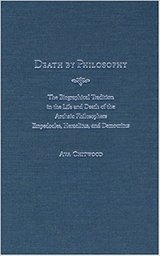
How does one die by philosophy? In Diogenes Laertius, philosophers jump into volcanoes, bury themselves in dung, get eaten by dogs, hang themselves, drown, and vanish into thin air -- sometimes all in a single lifetime. But what happens when we look beyond the fantastic and absurd to examine the particular ways that the philosophers' lives and deaths are recounted?
Ava Chitwood's reexamination of Diogenes Laertius's philosophical biographies opens a new window on the intellectual culture and context in which the work of philosophers like Empedocles, Heraclitus, and Democritus was read, received, and transmitted. Chitwood's analysis also suggests a methodology for understanding the interplay between biography and philosophy and for evaluating biographical sources.
While Chitwood's approach combines the disciplines of classical philology and philosophy, Death by Philosophy is not intended solely for the specialist. This investigation offers the modern reader a fascinating, fresh, and entertaining view of the ancient literary and philosophical world.
Ava Chitwood is Assistant Professor of Classics, at the University of South Florida.

There were heroic lives and deaths before and after, but none quite like Socrates'. He did not die by sword or spear, braving all to defend home and country, but as a condemned criminal, swallowing a painless dose of poison. And yet Socrates' death in 399 BCE has figured large in our world ever since, shaping how we think about heroism and celebrity, religion and family life, state control and individual freedom, the distance of intellectual life from daily activity--many of the key coordinates of Western culture. In this book Emily Wilson analyzes the enormous and enduring power the trial and death of Socrates has exerted over the Western imagination.
Beginning with the accounts of contemporaries like Aristophanes, Xenophon, and, above all, Plato, the book offers a comprehensive look at the death of Socrates as both a historical event and a controversial cultural ideal. Wilson shows how Socrates' death--more than his character, actions, or philosophical beliefs--has played an essential role in his story. She considers literary, philosophical, and artistic works--by Cicero, Erasmus, Milton, Voltaire, Hegel, and Brecht, among others--that used the death of Socrates to discuss power, politics, religion, the life of the mind, and the good life. As highly readable as it is deeply learned, her book combines vivid descriptions, critical insights, and breadth of research to explore how Socrates' death--especially his seeming ability to control it--has mattered so much, for so long, to so many different people.
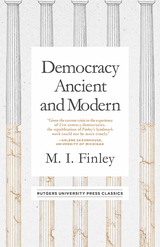
This classic study of democratic principles is thus now more relevant than ever. A renowned historian of antiquity and political philosophy, Sir M.I. Finley offers a comparative analysis of Greek and modern conceptions of democracy. As he puts the ancient Greeks in dialogue with their contemporary counterparts, Finley tackles some of the most pressing issues of our day, including public apathy, partisanship, consensus politics, distrust of professional politicians, and the limits of free speech.
Including three lectures that Finley delivered at Rutgers University, plus two additional essays that further illuminate his thinking, Democracy Ancient and Modern explores the dramatic differences between the close-knit civil society of the ancient Greeks and our own atomized mass societies. By mapping out democracy’s past and its present manifestations, this book helps us plot a course for democracy’s future.


Athens in the fifth century B.C. offers a striking picture: the first democracy in history; the first empire created and ruled by a Greek city; and a flourishing of learning, philosophical thought, and visual and performing arts so rich as to leave a remarkable heritage for Western civilization. To what extent were these three parallel developments interrelated? An international group of fourteen scholars expert in different fields explores here the ways in which the fifth-century "cultural revolution" depended on Athenian democracy and the ways it was influenced by the fact that Athens was an imperial city.
The authors bring to this analysis their individual areas of expertise--in the visual arts, poetry and drama, philosophy, archaeology, religion, and social, economic, and political history--and a variety of theoretical approaches. The product of a colloquium at Harvard's Center for Hellenic Studies in Washington, D.C., Democracy, Empire, and the Arts in Fifth-Century Athens sheds new light on a much debated question that has wide implications. The book is illustrated and enriched by a comprehensive bibliography on the subject.
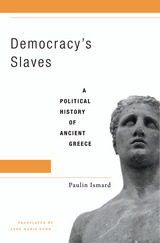
The ancient Greek statesman is a familiar figure in the Western political tradition. Less well known is the administrator who ran the state but who was himself a slave. Challenging the modern belief that democracy and bondage are incompatible, Paulin Ismard directs our attention to the cradle of Western democracy, ancient Athens, where the functioning of civic government depended crucially on highly skilled experts who were literally public servants—slaves owned by the city-state rather than by private citizens.
Known as dēmosioi, these public slaves filled a variety of important roles in Athenian society. They were court clerks, archivists, administrators, accountants, and policemen. Many possessed knowledge and skills beyond the attainments of average citizens, and they enjoyed privileges, such as the right to own property, that were denied to private slaves. In effect, dēmosioi were Western civilization’s first civil servants—though they carried out their duties in a condition of bound servitude.
Ismard detects a radical split between politics and administrative government at the heart of Athenian democracy. The city-state’s managerial caste freed citizens from the day-to-day responsibilities of running the state. By the same token, these public servants were unable to participate in the democratic process because they lacked the rights of full citizenship. By rendering the state’s administrators politically invisible, Athens warded off the specter of a government capable of turning against the citizens’ will. In a real sense, Ismard shows, Athenian citizens put the success of their democratic experiment in the hands of slaves.
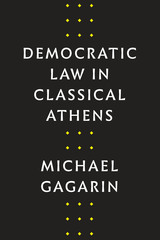
The democratic legal system created by the Athenians was completely controlled by ordinary citizens, with no judges, lawyers, or jurists involved. It placed great importance on the litigants’ rhetorical performances. Did this make it nothing more than a rhetorical contest judged by largely uneducated citizens that had nothing to do with law, a criticism that some, including Plato, have made?
Michael Gagarin argues to the contrary, contending that the Athenians both controlled litigants’ performances and incorporated many other unusual features into their legal system, including rules for interrogating slaves and swearing an oath. The Athenians, Gagarin shows, adhered to the law as they understood it, which was a set of principles more flexible than our current understanding allows. The Athenians also insisted that their legal system serve the ends of justice and benefit the city and its people. In this way, the law ultimately satisfied most Athenians and probably produced just results as often as modern legal systems do. Comprehensive and wide-ranging, Democratic Law in Classical Athens offers a new perspective for viewing a legal system that was democratic in a way only the Athenians could achieve.

With Democratic Swarms, Page duBois revisits the role of Greek comedy in ancient politics, considering how it has been overlooked as a political medium by modern theorists and critics. Moving beyond the popular readings of ancient Greece through the lens of tragedy, she calls for a revitalized look at Greek comedy. Rather than revisiting the sufferings of Oedipus and his family or tragedy’s relationship to questions of sovereignty, this book calls for comedy—its laughter, its free speech, its wild swarming animal choruses, and its rebellious women—to inform another model of democracy.
Ancient comedy has been underplayed in the study of Greek drama. Yet, with the irrepressible energy of the comic swarm, it provides a unique perspective on everyday life, gender and sexuality, and the utopian politics of the classical period of Athenian democracy. Using the concepts of swarm intelligence and nomadic theory, duBois augments tragic thought with the resistant, utopian, libidinous, and often joyous communal legacy of comedy, and she connects the lively anti-authoritarianism of the ancient comic chorus with the social justice movements of today.

Compared to the wealth of information available to us about classical tragedy and comedy, not much is known about the culture of pantomime, mime, and dance in late antiquity. Charges of obscenity and polemical anti-theater discourse have, at times, erased these popular performance traditions from the modern imagination. Demons and Dancers returns us to the times and places where those great ancient theaters were more than picturesque ruins dotting the Mediterranean landscape.
Ruth Webb fills this gap in our knowledge of the ancient world and provides us with a richly detailed look at social life in the late antique period through an investigation of its performance culture. The book focuses on the eastern empire, from Greece proper to modern-day Turkey and Egypt, between the second and sixth centuries CE. Using some of the tools provided by modern performance theory, this book explains how audiences interpreted the actions on stage, how the status of male and female performers shifted across time and place, how skilled the actors actually were (it was commonplace to dismiss these performers for their lack of skill), and what role spectacles involving spoken and sung words, as well as stylized gestures, had in Greco-Roman civic life.
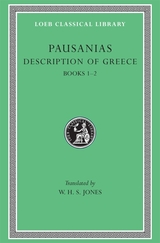
Antiquity’s original travel guide.
Pausanias, born probably in Lydia in Asia Minor, was a Greek of the second century AD, about 120–180, who traveled widely not only in Asia Minor, Palestine, Egypt, and North Africa, but also in Greece and in Italy, including Rome. He left a description of Greece in ten books, which is like a topographical guidebook or tour of Attica, the Peloponnese, and central Greece, filled out with historical accounts and events and digressions on facts and wonders of nature. His chief interest was in monuments of art and architecture, especially the most famous of them; the accuracy of his descriptions is proved by surviving remains.
The Loeb Classical Library edition of Pausanias is in five volumes; the fifth volume contains maps, plans, illustrations, and a general index.

Antiquity’s original travel guide.
Pausanias, born probably in Lydia in Asia Minor, was a Greek of the second century AD, about 120–180, who traveled widely not only in Asia Minor, Palestine, Egypt, and North Africa, but also in Greece and in Italy, including Rome. He left a description of Greece in ten books, which is like a topographical guidebook or tour of Attica, the Peloponnese, and central Greece, filled out with historical accounts and events and digressions on facts and wonders of nature. His chief interest was in monuments of art and architecture, especially the most famous of them; the accuracy of his descriptions is proved by surviving remains.
The Loeb Classical Library edition of Pausanias is in five volumes; the fifth volume contains maps, plans, illustrations, and a general index.

Antiquity’s original travel guide.
Pausanias, born probably in Lydia in Asia Minor, was a Greek of the second century AD, about 120–180, who traveled widely not only in Asia Minor, Palestine, Egypt, and North Africa, but also in Greece and in Italy, including Rome. He left a description of Greece in ten books, which is like a topographical guidebook or tour of Attica, the Peloponnese, and central Greece, filled out with historical accounts and events and digressions on facts and wonders of nature. His chief interest was in monuments of art and architecture, especially the most famous of them; the accuracy of his descriptions is proved by surviving remains.
The Loeb Classical Library edition of Pausanias is in five volumes; the fifth volume contains maps, plans, illustrations, and a general index.

Antiquity’s original travel guide.
Pausanias, born probably in Lydia in Asia Minor, was a Greek of the second century AD, about 120–180, who traveled widely not only in Asia Minor, Palestine, Egypt, and North Africa, but also in Greece and in Italy, including Rome. He left a description of Greece in ten books, which is like a topographical guidebook or tour of Attica, the Peloponnese, and central Greece, filled out with historical accounts and events and digressions on facts and wonders of nature. His chief interest was in monuments of art and architecture, especially the most famous of them; the accuracy of his descriptions is proved by surviving remains.
The Loeb Classical Library edition of Pausanias is in five volumes; the fifth volume contains maps, plans, illustrations, and a general index.

Antiquity’s original travel guide.
Pausanias, born probably in Lydia in Asia Minor, was a Greek of the second century AD, about 120–180, who traveled widely not only in Asia Minor, Palestine, Egypt, and North Africa, but also in Greece and in Italy, including Rome. He left a description of Greece in ten books, which is like a topographical guidebook or tour of Attica, the Peloponnese, and central Greece, filled out with historical accounts and events and digressions on facts and wonders of nature. His chief interest was in monuments of art and architecture, especially the most famous of them; the accuracy of his descriptions is proved by surviving remains.
The Loeb Classical Library edition of Pausanias is in five volumes; the fifth volume contains maps, plans, illustrations, and a general index.


Tracing the growth of ancient biography from the fifth century to the first century B.C., Arnaldo Momigliano asks fruitful questions about the origins and development of Greek biography. By clarifying the social and intellectual implications of the fact that the Greeks kept biography and autobiography distinct from historiography, he contributes to an understanding of a basic dichotomy in the Western tradition of historical writing. The Development of Greek Biography is fully annotated, and includes a bibliography designed to serve as an introduction to the study of biography in general.
This classic study is now reissued with the addition of Momigliano’s essay “Second Thoughts on Greek Biography” (1971).
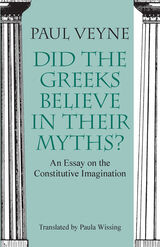

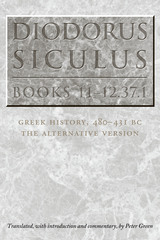
2007 — A Choice Magazine Outstanding Academic Book
Sicilian historian Diodorus Siculus (ca. 100-30 BCE) is our only surviving source for a continuous narrative of Greek history from Xerxes' invasion to the Wars of the Successors following the death of Alexander the Great. Yet this important historian has been consistently denigrated as a mere copyist who slavishly reproduced the works of earlier historians without understanding what he was writing. By contrast, in this iconoclastic work Peter Green builds a convincing case for Diodorus' merits as a historian. Through a fresh English translation of a key portion of his multi-volume history (the so-called Bibliotheke, or "Library") and a commentary and notes that refute earlier assessments of Diodorus, Green offers a fairer, better balanced estimate of this much-maligned historian.
The portion of Diodorus' history translated here covers the period 480-431 BCE, from the Persian invasion of Greece to the outbreak of the Peloponnesian War. This half-century, known as the Pentekontaetia, was the Golden Age of Periclean Athens, a time of unprecedented achievement in drama, architecture, philosophy, historiography, and the visual arts. Green's accompanying notes and commentary revisit longstanding debates about historical inconsistencies in Diodorus' work and offer thought-provoking new interpretations and conclusions. In his masterful introductory essay, Green demolishes the traditional view of Diodorus and argues for a thorough critical reappraisal of this synthesizing historian, who attempted nothing less than a "universal history" that begins with the gods of mythology and continues down to the eve of Julius Caesar's Gallic campaigns.
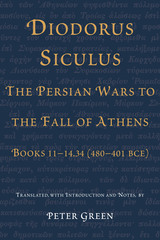
Only one surviving source provides a continuous narrative of Greek history from Xerxes' invasion to the Wars of the Successors following the death of Alexander the Great—the Bibliotheke, or "Library," produced by Sicilian historian Diodorus Siculus (ca. 90–30 BCE). Yet generations of scholars have disdained Diodorus as a spectacularly unintelligent copyist who only reproduced, and often mangled, the works of earlier historians. Arguing for a thorough critical reappraisal of Diodorus as a minor but far from idiotic historian himself, Peter Green published Diodorus Siculus, Books 11-12.37.1, a fresh translation, with extensive commentary, of the portion of Diodorus's history dealing with the period 480–431 BCE, the so-called "Golden Age" of Athens.
This is the only recent modern English translation of the Bibliotheke in existence. In the present volume—the first of two covering Diodorus's text up to the death of Alexander—Green expands his translation of Diodorus up to Athens' defeat after the Peloponnesian War. In contrast to the full scholarly apparatus in his earlier volume (the translation of which is incorporated) the present volume's purpose is to give students, teachers, and general readers an accessible version of Diodorus's history. Its introduction and notes are especially designed for this audience and provide an up-to-date overview of fifth-century Greece during the years that saw the unparalleled flowering of drama, architecture, philosophy, historiography, and the visual arts for which Greece still remains famous.
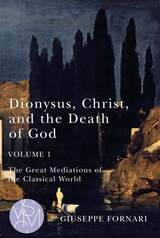
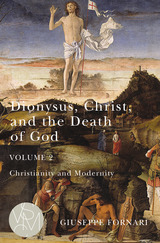
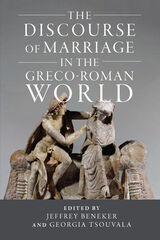
Through aesthetically informed and sensitive modes of analysis, these contributors examine a wealth of representations—including violence in weddings and spousal devotion after death. The Discourse of Marriage in the Greco-Roman World demonstrates the varying conceptions of an institution that was central to ancient social and political life—and remains prominent in the modern world. This volume will contribute to scholars' understanding of the era and fascinate anyone interested in historic depictions of marriage and the role and status of women in the late Hellenistic and early Imperial periods.

From slave to sage.
Epictetus was a crippled Greek slave of Phrygia during Nero’s reign (AD 54–68) who heard lectures by the Stoic Musonius before he was freed. Expelled with other philosophers by the emperor Domitian in 89 or 92, he settled permanently in Nicopolis in Epirus. There, in a school that he called “healing place for sick souls” he taught a practical philosophy, details of which were recorded by Arrian, a student of his, and survive in four books of Discourses and a smaller Encheiridion, a handbook that gives briefly the chief doctrines of the Discourses. He apparently lived into the reign of Hadrian (AD 117–138).
Epictetus was a teacher of Stoic ethics, broad and firm in method, sublime in thought, and now humorous, now sad or severe in spirit. How should one live righteously? Our god-given will is our paramount possession, and we must not covet others’. We must not resist fortune. Man is part of a system; humans are reasoning beings (in feeble bodies) and must conform to god’s mind and the will of nature. Epictetus presents us also with a pungent picture of the perfect (Stoic) man.
The Loeb Classical Library edition of Epictetus is in two volumes.

From slave to sage.
Epictetus was a crippled Greek slave of Phrygia during Nero’s reign (AD 54–68) who heard lectures by the Stoic Musonius before he was freed. Expelled with other philosophers by the emperor Domitian in 89 or 92, he settled permanently in Nicopolis in Epirus. There, in a school that he called “healing place for sick souls” he taught a practical philosophy, details of which were recorded by Arrian, a student of his, and survive in four books of Discourses and a smaller Encheiridion, a handbook that gives briefly the chief doctrines of the Discourses. He apparently lived into the reign of Hadrian (AD 117–138).
Epictetus was a teacher of Stoic ethics, broad and firm in method, sublime in thought, and now humorous, now sad or severe in spirit. How should one live righteously? Our god-given will is our paramount possession, and we must not covet others’. We must not resist fortune. Man is part of a system; humans are reasoning beings (in feeble bodies) and must conform to god’s mind and the will of nature. Epictetus presents us also with a pungent picture of the perfect (Stoic) man.
The Loeb Classical Library edition of Epictetus is in two volumes.
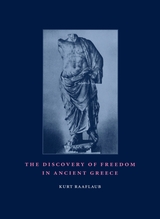
To find out, Raaflaub analyses ancient Greek texts from Homer to Thucydides in their social and political contexts. Archaic Greece, he concludes, had little use for the idea of political freedom; the concept arose instead during the great confrontation between Greeks and Persians in the early fifth century BCE. Raaflaub then examines the relationship of freedom with other concepts, such as equality, citizenship, and law, and pursues subsequent uses of the idea—often, paradoxically, as a tool of domination, propaganda, and ideology.
Raaflaub's book thus illuminates both the history of ancient Greek society and the evolution of one of humankind's most important values, and will be of great interest to anyone who wants to understand the conceptual fabric that still shapes our world views.
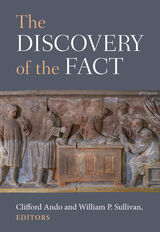

J. Lesley Fitton traces this exciting tale of scholarly discovery and weaves it into an engaging, in-depth portrait of Greek Bronze Age civilizations, from their dawning on the Cycladic Isles in the third millennium B.C. to their later flowering in Minoan Crete and then in the Mycenaean centers and finally to their mysterious disappearance in the twelfth century B.C. The result is an elegant assimilation of vast historical detail and a well-illustrated tour of the art and artifacts, the grand palaces and tombs, the mythical heroes and Trojan treasures that form at least one cradle of our own civilization.
Fitton begins with the early finds of travelers, advances in geology, and research into Homer's identity. She vividly recreates the heroic age of the first archaeological excavations, particularly Heinrich Schliemann's fascinating work at Troy and Mycenae, and Arthur Evans's pioneering excavation and restoration of the Palace of Minos on Crete. The persistent search for signs of writing among Bronze Age Greeks culminates in Fitton's description of the 1952 deciphering of the earliest script used to write Greek. And as her account extends into the present, it encompasses the important contributions of the archaeologists Alan Wace and Carl Blegen, the War's impact on research, and a concise summation of current scholarly trends.
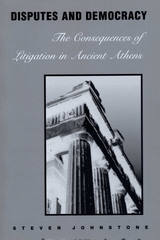
Athenians performed democracy daily in their law courts. Without lawyers or judges, private citizens, acting as accusers and defendants, argued their own cases directly to juries composed typically of 201 to 501 jurors, who voted on a verdict without deliberation. This legal system strengthened and perpetuated democracy as Athenians understood it, for it emphasized the ideological equality of all (male) citizens and the hierarchy that placed them above women, children, and slaves.
This study uses Athenian court speeches to trace the consequences for both disputants and society of individuals' decisions to turn their quarrels into legal cases. Steven Johnstone describes the rhetorical strategies that prosecutors and defendants used to persuade juries and shows how these strategies reveal both the problems and the possibilities of language in the Athenian courts. He argues that Athenian "law" had no objective existence outside the courts and was, therefore, itself inherently rhetorical. This daring new interpretation advances an understanding of Athenian democracy that is not narrowly political, but rather links power to the practices of a particular institution.
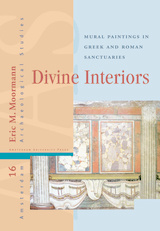
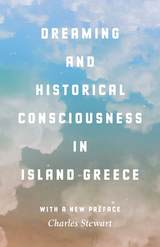
Charles Stewart tells the story of the inhabitants of Kóronos, on the Greek island of Naxos, who, in the 1830s, began experiencing dreams in which the Virgin Mary instructed them to search for buried Christian icons nearby and build a church to house the ones they found. Miraculously, they dug and found several icons and human remains, and at night the ancient owners of them would speak to them in dreams. The inhabitants built the church and in the years since have experienced further waves of dreams and startling prophesies that shaped their understanding of the past and future and often put them at odds with state authorities. Today, Kóronos is the site of one of the largest annual pilgrimages in the Mediterranean. Telling this fascinating story, Stewart draws on his long-term fieldwork and original historical sources to explore dreaming as a mediator of historical change, while widening the understanding of historical consciousness and history itself.
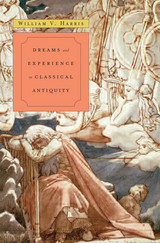
From the Iliad to Aristophanes, from the gospel of Matthew to Augustine, Greek and Latin texts are constellated with descriptive images of dreams. Some are formulaic, others intensely vivid. The best ancient minds—Plato, Aristotle, the physician Galen, and others—struggled to understand the meaning of dreams.
With Dreams and Experience in Classical Antiquity the renowned ancient historian William Harris turns his attention to oneiric matters. This cultural history of dreams in antiquity draws on both contemporary post-Freudian science and careful critiques of the ancient texts. Harris traces the history of characteristic forms of dream-description and relates them both to the ancient experience of dreaming and to literary and religious imperatives. He analyzes the nuances of Greek and Roman belief in the truth-telling potential of dreams, and in a final chapter offers an assessment of ancient attempts to understand dreams naturalistically.
How did dreaming culture evolve from Homer’s time to late antiquity? What did these dreams signify? And how do we read and understand ancient dreams through modern eyes? Harris takes an elusive subject and writes about it with rigor and precision, reminding us of specificities, contexts, and changing attitudes through history.
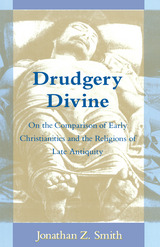
"An important book, and certainly one of the most significant in the career of Jonathan Z. Smith, whom one may venture to call the greatest pathologist in the history of religions. As in many precedent cases, Smith follows a standard procedure: he carefully selects his victim, and then dissects with artistic finesse and unequaled acumen. The operation is always necessary, and a deconstructor of Smith's caliber is hard to find."—Ioan P. Coulianu, Journal of Religion
READERS
Browse our collection.
PUBLISHERS
See BiblioVault's publisher services.
STUDENT SERVICES
Files for college accessibility offices.
UChicago Accessibility Resources
home | accessibility | search | about | contact us
BiblioVault ® 2001 - 2024
The University of Chicago Press









